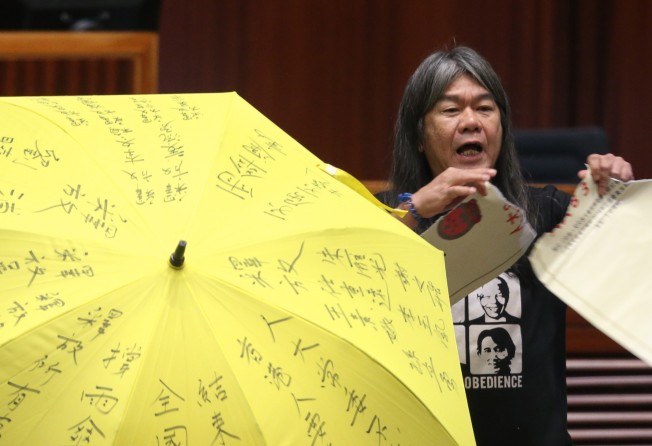Ousted Hong Kong lawmaker ‘Long Hair’ Leung Kwok-hung loses bid to reclaim seat
- Veteran activist was disqualified from Legco for improper oath-taking, with judge this time ruling his challenge is ‘impermissible’
- Leung has vowed to take the case to the city’s top court

Disqualified pro-democracy lawmaker “Long Hair” Leung Kwok-hung lost his bid to reclaim his seat on Friday with Hong Kong’s Court of Appeal ruling that he had raised an “impermissible challenge”.
Leung, who was among six opposition lawmakers ousted for improper oaths, vowed to appeal to the city’s top court, hopefully with the assistance of legal aid.
He is the last of three in the group to challenge their removals, initiated by the previous administration led by then chief executive Leung Chun-ying.
“There are two foreign judges at the Court of Final Appeal,” he told reporters after receiving the judgment. “I think they will be more courageous than the others.”
Three Court of Appeal judges unanimously agreed on Friday that Leung Kwok-hung had raised “an impermissible challenge” and found that the lower court was “plainly right” in concluding the activist, who had been a lawmaker for 13 years, had declined or neglected to take his oath, which warranted automatic disqualification.
At his swearing-in ceremony on October 12, 2016, Leung wore a black T-shirt with the words “civil disobedience”, held up a yellow umbrella symbolic of the 2014 Occupy protests, and chanted slogans demanding democracy and the chief executive’s resignation.
A month later, the National People’s Congress Standing Committee (NPCSC), China’s top legislative body, issued an interpretation of Article 104 of the Basic Law, the city’s mini-constitution, requiring oath-takers to swear sincerely, solemnly and accurately – with retrospective effect from July 1, 1997.
Leung was stripped of his Legislative Council seat by the Court of First Instance in July 2017.
In an appeal, his counsel Martin Lee Chu-ming SC attacked the validity, scope and effect of the NPCSC interpretation. It was also argued that Leung had a legitimate expectation his oath would be considered valid, given previous council rulings – permitting similar antics – and that there had been no change to the relevant Oaths and Declarations Ordinance.
But Mr Justice Jeremy Poon Shiu-chor observed that the top court had already offered “a complete answer” to Lee’s challenges on the interpretation as recently as September 2017, when two other disqualified lawmakers, Sixtus Baggio Leung Chung-hang and Yau Wai-ching, applied for leave to appeal.
In throwing out their case, the Appeal Committee said it was satisfied that the interpretation was “clear in its scope and effect” and that it was binding on all Hong Kong courts.
Three other ousted lawmakers, namely Lau Siu-lai, Edward Yiu Chung-yim and Nathan Law Kwun-chung did not pursue their case.
“With respect, most, if not all of Mr Lee’s arguments [on the interpretation] are flatly contradicted by an array of well-established authorities,” Poon wrote on behalf of Court of Appeal vice-president Johnson Lam Man-hon and Mr Justice Aarif Barma.
“It is plain … the interpretation, properly understood, states what the Hong Kong law has always been.”
As such, Poon disagreed that the interpretation had “usurped the functions of Legco” in enacting laws and he further concluded there was no need to amend the ordinance as Lee had called for.
Poon also pointed out that Lee’s reliance on past Legco practices was “wholly misplaced” since neither the Legco clerk nor president was the ultimate decision maker on such legal matters and consequences of non-compliance.
“They cannot possibly bind the courts, the ultimate adjudicator, which has a constitutional duty to uphold the constitutional requirements,” he said.
“In our view, the [lower court] judge was perfectly entitled to make the factual findings as he did [and those] findings are plainly right.”
Leung said he felt he had been “shoved aside” by the judges.
Nathan Law, who was disqualified by the same court ruling, said he already expected an unfavourable ruling for Leung as Hong Kong courts were under political pressure from Beijing.
His views were echoed by Council Front lawmaker Claudia Mo Man-ching, but she said: “We will wait to see what the Court of Final Appeal has to say about the case.” The front is an alliance of six pro-democracy lawmakers.
Pro-establishment legislators meanwhile backed the court’s ruling.
Business and Professionals Alliance lawmaker Priscilla Leung Mei-fun, who is a member of the Basic Law Committee, said: “Hong Kong courts have always respected the NPCSC’s decisions.”
Meanwhile, Democratic Alliance for the Betterment and Progress of Hong Kong vice-chairman Horace Cheung Kwok-kwan said the stern ruling would help prevent lawmakers from using the oath-taking ceremony to seek attention.